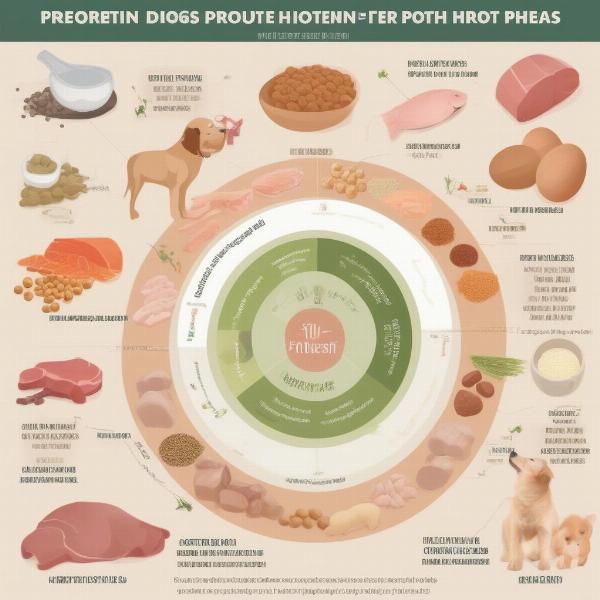Protein is essential for a dog’s health, contributing to muscle growth, tissue repair, and a strong immune system. While a balanced diet typically provides sufficient protein, some situations may warrant supplementation with protein powder for dogs. This article delves into the benefits, risks, and practical applications of protein powder, guiding you to make informed decisions for your canine companion.
Is protein powder beneficial for all dogs? What are the potential downsides of using it? How can you choose the right protein powder for your furry friend? This guide answers these questions and more, providing a comprehensive overview of protein powder for dogs. We’ll explore different protein sources, discuss appropriate dosages, and highlight important considerations for various life stages and health conditions.
Understanding the Role of Protein in a Dog’s Diet
Protein provides the building blocks for a dog’s body, supporting healthy growth and development. From puppies to seniors, adequate protein intake is crucial for maintaining muscle mass, promoting a glossy coat, and ensuring optimal organ function. While commercial dog foods typically contain sufficient protein, certain circumstances, such as strenuous activity, illness, or recovery from surgery, may require additional protein support. This is where protein powder for dogs can play a valuable role.
 Protein Sources for Dogs
Protein Sources for Dogs
Benefits of Protein Powder for Dogs
Protein powder can offer several benefits for dogs:
- Muscle Growth and Repair: For active dogs or those recovering from injury, protein powder can help build and repair muscle tissue.
- Weight Management: Protein can promote satiety, helping dogs feel fuller for longer and potentially aiding in weight management.
- Enhanced Recovery: After surgery or illness, protein powder can support faster healing and recovery.
- Improved Coat and Skin Health: Protein contributes to a healthy coat and skin, reducing shedding and promoting a shiny, vibrant appearance.
- Immune System Support: Adequate protein intake is essential for a strong immune system, helping dogs fight off infections and diseases.
Choosing the Right Protein Powder for Your Dog
Not all protein powders are created equal. When selecting a protein powder for your dog, consider the following factors:
- Protein Source: Common sources include whey, casein, soy, brown rice, and pea protein. Choose a source that aligns with your dog’s dietary needs and any potential allergies.
- Quality: Opt for high-quality protein powders from reputable brands that prioritize purity and safety.
- Digestibility: Look for protein powders that are easily digestible to minimize stomach upset.
- Additives: Avoid protein powders with artificial sweeteners, colors, or flavors.
How to Use Protein Powder for Dogs
Protein powder can be easily incorporated into your dog’s diet. Mix the recommended dosage with their food, ensuring it’s thoroughly combined. Start with a small amount and gradually increase to the desired level. Always consult your veterinarian before introducing any new supplements to your dog’s diet, especially if they have underlying health conditions.
Potential Risks and Considerations
While protein powder can be beneficial, it’s crucial to be aware of potential risks:
- Kidney Issues: Excessive protein intake can strain the kidneys, particularly in dogs with pre-existing kidney disease.
- Digestive Problems: Some dogs may experience digestive upset, such as diarrhea or vomiting, when introduced to protein powder.
- Allergies: Dogs can develop allergies to certain protein sources, so monitor for any signs of allergic reactions.
Conclusion
Protein powder for dogs can be a valuable supplement in specific situations, supporting muscle growth, recovery, and overall health. However, it’s crucial to choose the right protein source, follow recommended dosages, and consult with your veterinarian to ensure it aligns with your dog’s individual needs. By understanding the benefits, risks, and proper usage, you can make informed decisions to enhance your furry friend’s well-being.
FAQ
- Is protein powder necessary for all dogs? No, most dogs receive sufficient protein from a balanced diet. Supplementation is typically recommended for specific needs like intense activity, illness, or recovery.
- Can puppies have protein powder? Consult your veterinarian before giving protein powder to puppies, as their protein requirements differ from adult dogs.
- What are signs of protein deficiency in dogs? Signs may include weight loss, muscle wasting, dull coat, and weakened immune system.
- Can I give my dog human protein powder? It’s generally recommended to use protein powders specifically formulated for dogs to ensure appropriate nutrient balance and avoid potential toxins.
- How much protein powder should I give my dog? Follow the manufacturer’s instructions and consult your veterinarian for personalized recommendations.
- What are some good protein sources for dogs? Meat, fish, eggs, chicken, chicken strips for dogs, and plant-based options like lentils and chickpeas are good sources of protein. You can also consider adding dog food powder as a supplement.
- What should I do if my dog has an adverse reaction to protein powder? Discontinue use immediately and consult your veterinarian.
ILM Dog is your trusted global resource for expert advice on dog care and nutrition. We offer comprehensive information on dog breeds, health, training, nutrition, grooming, and much more. Whether you’re a new dog owner or a seasoned enthusiast, ILM Dog is here to support you every step of the way. For personalized guidance or further inquiries, contact us at [email protected] or +44 20-3965-8624. Visit ILM Dog for more valuable resources and expert advice on all aspects of dog care, including information on all meat hot dogs, chlorella for dogs and liquid collagen for dogs.